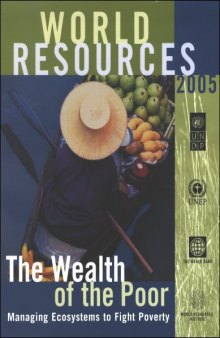 جزییات کتاب
جزییات کتاب
Ecosystems are--or can be--the wealth of the poor. For many of the 1.1 billion people living in severe poverty, nature is a daily lifeline—an asset for those with few other material means. This is especially true for the rural poor, who comprise three-quarters of all poor households worldwide. Harvests from forests, fisheries and farm fields are a primary source of rural income, and a fall-back when other sources of employment falter. But programs to reduce poverty often fail to account for the important link between environment and the livelihoods of the rural poor—not just a survival mechanism—has yet to be effectively tapped. The thesis of World Resources 2005 is that income from ecosystems--what we call environmental income--can act as a fundamental stepping stone in the economic empowerment of the rural poor. This requires that the poor manage ecosystems so that they support stable productivity over time. Productive ecosystems are the basis of a sustainable income stream from nature. But for the poor to tap that income, they must be able to reap the benefits of their good stewardship. Unfortunately, the poor are rarely in such a position of power over natural resources. An array of governance failures typically intervene: lack of legal ownership and access to ecosystems, political marginalization, and exclusion from the decisions that affect how these ecosystems are managed. Without addressing these failures, there is little chance of using the economic potential of ecosystems to reduce rural poverty. World Resources 2005 details the steps necessary to empower the poor to use ecosystems both wisely and for wealth of statistics on current environmental, social, and economic trends in more than 150 countries.



 دانلود کتاب
دانلود کتاب

 جزییات کتاب
جزییات کتاب





 این کتاب رو مطالعه کردید؟ نظر شما چیست؟
این کتاب رو مطالعه کردید؟ نظر شما چیست؟
